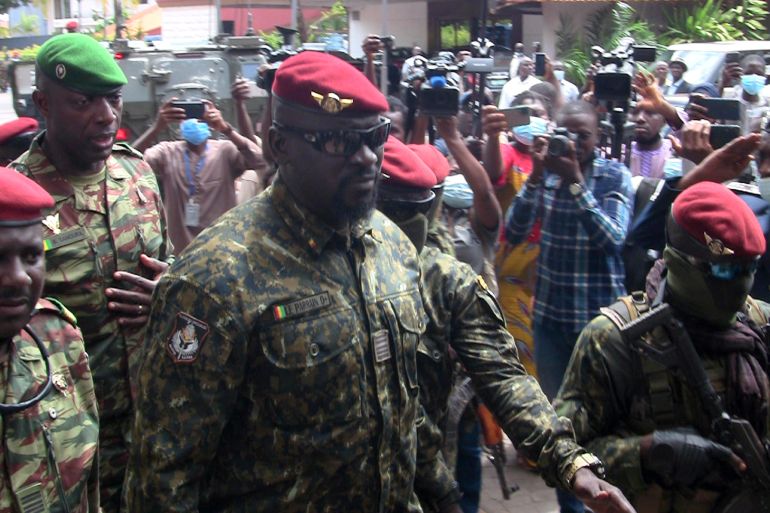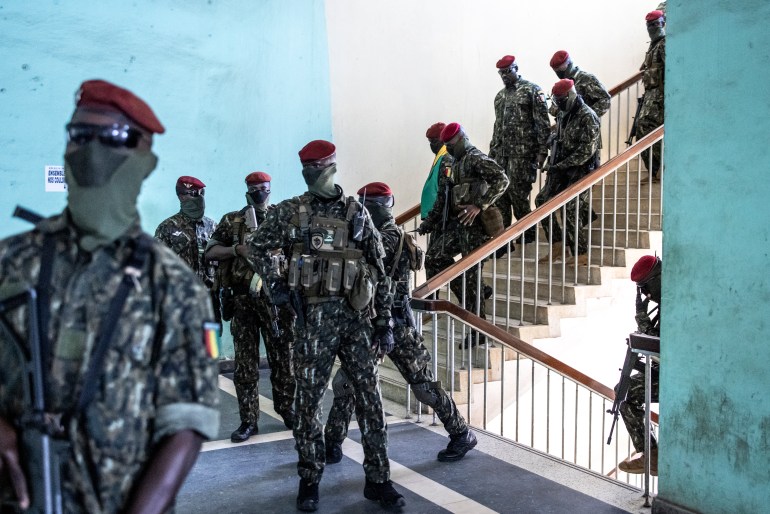Guinea opposition condemns 39-month move to civilian rule
Colonel Mamady Doumbouya says on state television after political consultations he is considering a transition of 39 months.

Opposition leaders in Guinea have roundly condemned the announcement by the leader of the military junta that they would press for a 39-month transition period to civilian rule.
The party of the ousted president Alpha Conde and opposition groups that had opposed him united in denouncing the decision on Sunday.
Keep reading
list of 4 itemsGuinea and Burkina Faso risk more sanctions over transition delay
Former Guinea president Conde released from house arrest
Analysis: In Guinea Bissau, April brings reminders of instability
Their statements came as UN chief Antonio Guterres called on the military junta in Burkina Faso, Guinea and Mali to hand power back to civilians as soon as possible.
Colonel Mamady Doumbouya, head of the military government that took power in September, told state television late on Saturday that after political consultations he was considering a transition of 39 months, the first time he has proposed a timeline.
He said the National Transition Council (CNT) would put the proposal to parliament.
A day earlier, the army-dominated government had said the forum considering the issue had considered a transition period of between 18 and 52 months. Doumbouya said the period he had opted for was the “median proposal”.
But the influential FNDC coalition, which includes some 20 political groups, said in a statement that choice had no legal basis and was “inadmissible, inconceivable and unacceptable”.
It added: “The attitude of the authorities… constitutes a threat to peace and national unity.”
The FNDC, which staged huge protests against Conde before he was overthrown, also argued it ignored widespread calls for an inclusive dialogue under the supervision of the international community.
Conde’s former party the Rally of the People of Guinea (RPG) also rejected the decision. It too called for an inclusive dialogue under the mediation of the international community to fix a “consensual” calendar.
Doumbouya said Saturday his decision had been reached after an inclusive consultation process, but it was boycotted by several prominent political groups who disputed its legitimacy.
Guterres made his comments Sunday after talks in Dakar with Senegalese President Macky Sall.
They had agreed on the need to keep talking to the de facto authorities in all three countries so as to get a swift return to “constitutional order”, he said.
Regional pressure
The proposal is certain to upset West Africa’s political bloc that has called for a swift return to constitutional order after last year’s coup.
In September 2021, army officers led by Doumbouya removed elected Conde in the impoverished former French colony.
Conde, 84, had drawn fierce opposition after he pushed through a new constitution in 2020 that allowed him to run for a third presidential term.

The Economic Community of West African States (ECOWAS) had set last Monday as a deadline for putting forward an “acceptable” transition timetable or risk economic and financial sanctions.
Guinea’s ruling military let the deadline pass, however, asking ECOWAS for more time for consultations to continue.
ECOWAS has called for an “acceptable” timeline for a return to civilian rule, failing which it has threatened to extend sanctions applied to Guinea following the coup.
Coups in West Africa
Military leaders have also snatched power in Mali, Burkina Faso, and Guinea over the last two years, raising concerns of a backslide in democracy in West Africa, which over the past decade had begun to shed its reputation as a “coup belt”.
The coups have put the countries at odds with ECOWAS, which is trying to put power back in civilian hands.
ECOWAS has already imposed broad sanctions on Mali after military leaders proposed holding onto power until 2025, hammering its fragile economy by shutting it off from regional trade and financial markets. ECOWAS has given Mali 12-16 months to organise democratic elections.
When Burkina Faso’s leaders proposed a three-year transition to civilian rule, ECOWAS called for “a more acceptable timeline”, but stopped short of imposing sanctions on the impoverished state.
ECOWAS has imposed sanctions on Guinea’s military leaders but not on the wider economy. A spokesperson was not available for comment on Guinea’s new timeline.